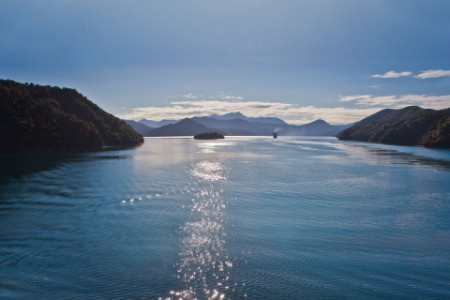Overview
Sailing between Wellington in New Zealand’s North Island and Picton in the South Island several times a day, the Interislander offers one of the most picturesque ferry journeys in the world.
With the last major upgrade of its ferries back in the 1990s, Interislander’s owner, KiwiRail, was ready to invest in new vessels that would double the number of passengers and vehicles it could accommodate per trip. Importantly, the upgrade would enable a 300% increase in rail wagons when compared to the existing fleet.
Carbon efficiency was a key component of the brief given to OSK, the Danish naval architects that led the vessel design process. So, too, was battery capability to ensure the designs were future proofed as much as possible.
Actions
To achieve certification from CBI, a vessel must achieve a strict set of carbon reduction targets over the term of the loan and demonstrate a plan to achieve zero emissions by 2050.
To do this, the team mapped out a practical and economic pathway for the new battery capacity. This included future-proofing the vessels’ electrical systems to allow for scaling of up to 100% battery usage during their lifetime. Added battery capacity and installation will occur at regular upgrades or refits – typically at five-year intervals.
KiwiRail expects to more than double battery capacity by mid-next decade, which will mean greater distances can be powered by batteries, driving down carbon emissions. This is significant, as switching to renewable fuel sources is not simple. Large ships travel long distances, and the batteries available today lack the energy density required to power these enormous vessels. It is not surprising that, up until KiwiRail’s certification, CBI had not found a single ship able to meet its carbon reduction standards.
KiwiRail was praised by CBI for having taken a leadership position. The initial certification signalled a turning point for operators and investors, opening new pathways for capex and investment to mitigate emissions from global shipping.
Outcomes
When the ferries set sail, in 2025 and 2026, they will reduce Interislander’s carbon emissions by 40% with their combination of diesel, battery and shore power.
As KiwiRail Group Treasurer and Insurance Manager Michael Yannakis says: “Through smart design of the hull and machinery space, the new ferries have been future-proofed to allow us to increase battery use over time, so we can run entirely on battery and shore power, or to use other low-carbon fuel sources, as they become commercially available and have a reliable supply line.”


